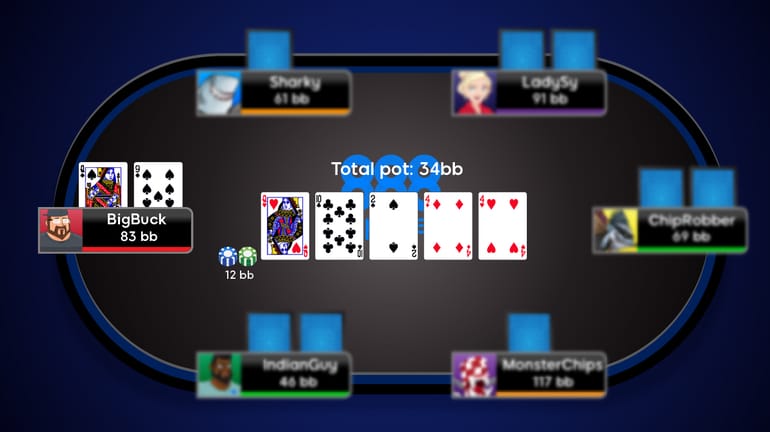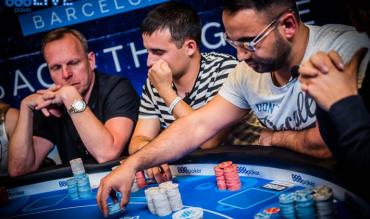Perhaps we have heard other poker players use the term “blocking bets”, “blocker bets” or “block bets” and wondered what they mean by the word precisely.
Or perhaps we are familiar with the concept of blocking bets and wonder whether there is any strategic merit to a well-timed block bet.
Let’s discuss the answers – they might be surprising.
Table of Contents
What is a Blocking Bet in Poker?
Let’s start with a quick definition of what poker players typically mean when they reference the concept of blocking bets.
Blocking bet - A small bet made (usually OOP) in an attempt to “buy” a cheap showdown.
Before we discuss whether blocking bets actually make sense in poker, let’s consider an example scenario:
Example(River Scenario)
Pot Size: 34bb
Remaining Stacks: 83bb
Board: QhTc2s4d4h
Hero’s Hand: Qs9s
Hero bets 12bb into the 34bb pot.

Hero is out-of-position on the river with a weak top pair after calling big bets on both the flop and turn. He is worried that he might not be able to call another big bet if his opponent fires.
Hero decides that if he makes a small bet out-of-position, he might be able to get to showdown more cheaply.
Perhaps his opponent will call instead of raising the river bet.
Do Blocking Bets Work in Practice?
The concept of blocking bets is mathematically flawed, to put it bluntly. If we came here hoping to learn why blocking bets are great and how they can make us money, unfortunately, that’s not what we are going to discuss.
The maths very simply doesn’t support the profitability of block bets.
Why not?
Because our opponent still has the option to raise our blocking bet. We aren’t realistically preventing a skilled opponent from correctly raising when he has the best hand. In fact, we are merely investing additional chips in a scenario where we are hoping to see showdown as cheaply as possible, which is counterproductive.
So why do blocking bets sometimes seem to work?
In truth, any poker play could end up being the best if our opponent responds in a sub-optimal way. Blocking bets are an attempt at a psychological trick which may sometimes produce positive results. Our opponent may fold too much vs the small bet, for example.
Indeed, our opponent may also call with his stronger hands rather than raising for value, allowing us to lose less –but this is questionable reasoning.
Wouldn’t check/folding be even better if we knew we were beat?
The Problems with Blocking Bets
Let’s analyse two of the points that advocates of blocking bets would typically make.
- Our opponent calls with hands that he was planning to value bet big, allowing us to reach showdown more cheaply.
This strategy might seem logical on the surface, but there are severe issues with the thought process. It’s certainly true that we lose less if our opponent calls our small bet rather than us calling his big bet. That does not imply that betting small is the best play, though.
If we check and our opponent is not betting worse holdings ata frequency that allows us to call, the best option is to fold. Check folding will perform significantly better than betting small into a strong range.
The added advantage of this line is that we’ll typically have a non-zero amount of equity realisation. We’ll still get to see a showdown with some frequency when the river goes check-check.
- Our opponent likes to bluff a lot. By making a blocking bet, we can get him to reconsider and fold his bluffs.
If our opponent is bluffing a lot, we have an exploitative opportunity. We can check/call vs his river bet and exploit the fact that he over-bluffing. There is no need for us to try and shut down his aggression by betting the river ourselves.
We may find ourselves folding out the hands that we beat while getting called by all the hands that beat us.
It’s not generally correct to turn hands with significant showdown value into bluffs.
Blocker Bets – Thin Value in Disguise?
We’re not saying that small bets OOP (out-of-position) on the river are incorrect in general. Several scenarios exist where small river bets OOP are not only reasonable but candidates for being the best play.
Such plays look like blocker bets and are even called blocker bets by many players. But, if the intention behind the bet is not the “psychological trick” described above, then these bets are not truly blocking bets.
The description of a bet should always revolve around the intention of the bet, not the scenario.
Example 2 – River Scenario
Pot Size: 34bb
Remaining Stacks: 83bb
Board: QsTh7c5d2h
Hand: KsQh
Hero bets 12bb into the 34bb pot.
Hero has bet two streets out-of-position (OOP) in a single-raised, heads-up pot. Typically, top-pair-second-kicker will not be worth three streets of value, but Hero has observed that Villain tends to call too wide.
Hero also knows that Villain will not stab as a bluff if checked to on the river. The EV of a check/call when facing a bet is hence questionable. If Hero makes a small bet here, he can expect to be a favourite against Villain’s calling range (i.e. above 50% pot equity when called). Betting OOP is a sound, principled decision.
It might appear that there is no significant difference when compared to our first example. The pot size is the same, the bet size is the same, and we hold a TPWK (top pair weak kicker) in both instances. It’s easy to see how an observer might refer to both of these plays as “blocking bets”.
However, the difference is the intention behind the play and the understanding of the scenario.
In example one, Hero is making a blocking bet based on a flawed understanding of the mathematics of poker. It’s a bad decision.
In example two, Hero makes an excellent thin value bet based on a good knowledge of poker and his understanding of Villain’s tendencies.
Let’s see a final example:
Example 3 – River Scenario
Pot Size: 34bb
Remaining Stacks: 83bb
Board: QsTh7c5d2h
Hand: Jd9d
Hero bets 12bb into the 34bb pot.
Similar river setup, but Hero now has an air-type hand after his OESD (open-ended-straight-draw) bricks on the river. Is this a good play or not?
Once more, it depends on Hero’s understanding of his opponent. Imagine for a minute that Villain folds way too frequently vs small river bets OOP. This situation would be a candidate for the best play in such circumstances.
Should we refer to it as a blocker bet?
An observer might use that terminology, especially if he could not see Hero’s hole cards. The intention, however, is to run a cheap bluff. This play is again a sound, principled decision in scenarios where Hero has the right read.
It is a bluff, not a blocking bet.
Blocking Bets on Other Street
Despite being flawed, blocking bets are traditionally made on the river. Some players have taken the unsound concept and attempted to apply it to earlier streets. If we understand well why river blocking bets are problematic, we should also be able to see why blocking bets on earlier streets have even bigger problems.
Imagine, for example, we make a blocking bet on the turn OOP. We are not buying a cheaper showdown in such a case (which is the general intention of blocking bets). Even if our opponent calls our small turn bet, he has the freedom of making large bets (even all-ins) on the river.
Some players try to solve this by making small blocker bets on both the turn and river. This play solves nothing since Villain still has the freedom to raise at any point. However, this fact does not mean that small turn and river bets are necessarily bad, simply that the concept of blocking bets is flawed.
Good players may frequently make small bets OOP on the turn and river, but for different reasons.
Blocking Bets In Position on the River
Out of all the scenarios discussed, making a blocking bet IP (in position) on the river shows the worst possible understanding of the topic. It doesn’t even make sense by the standards of incorrect blocking bet logic. The goal is presumably to see a showdown as cheaply as possible. When last to act IP on the river, we are guaranteed to see a showdown for free by checking back. Making a blocking bet “reopens” the action while inflating the size of the pot further.
While, hopefully, no readers have ever attempted the IP blocking bet, there is a compelling strategic concept that can be derived from thinking about the topic.
Small bets IP on the river are often questionable and should be subject to a high level of scrutiny.
Regardless of whether the small river bet IP is a blocker bet or not, we should be careful when making small river bets IP. We can fully realise our equity when checking. In scenarios where we bet, we reopen the action and allow our opponent to potentially blow us off our holding.
It’s not too difficult to demonstrate with the assistance of EV calculations that the threat of a check-raise when going for thin value, really eats into the expectation of our river bet.
OOP is an entirely different scenario. We don’t automatically see showdown when we check. If we check, our opponent retains the ability to make a big bet IP. Even if we bet, our opponent retains the ability to raise.
Since it’s impossible to neutralise the threat of a raise (unless we go all in ourselves), small river bets for thin value are often highly incentivised.
In other words -
Small river bets OOP – Often a candidate for the best play
Small river bets IP – Often questionable.
We’re not saying that small river bets can never be made while IP. However, we need to ascertain that our opponent is rarely check/raising before pulling the trigger on a thin value bet.
Blocking Bets in Poker Strategy
Next time we are at the tables or frequenting the online forums, we might think differently when the topic of block betting comes up. We may even see discussions regarding the merits of block betting and how to use it at the tables.
When such things occur, there is no need to try and correct the other players. Just take a moment and smile.
Think how big your bankroll will grow as players continue to block bet for many years to come.


